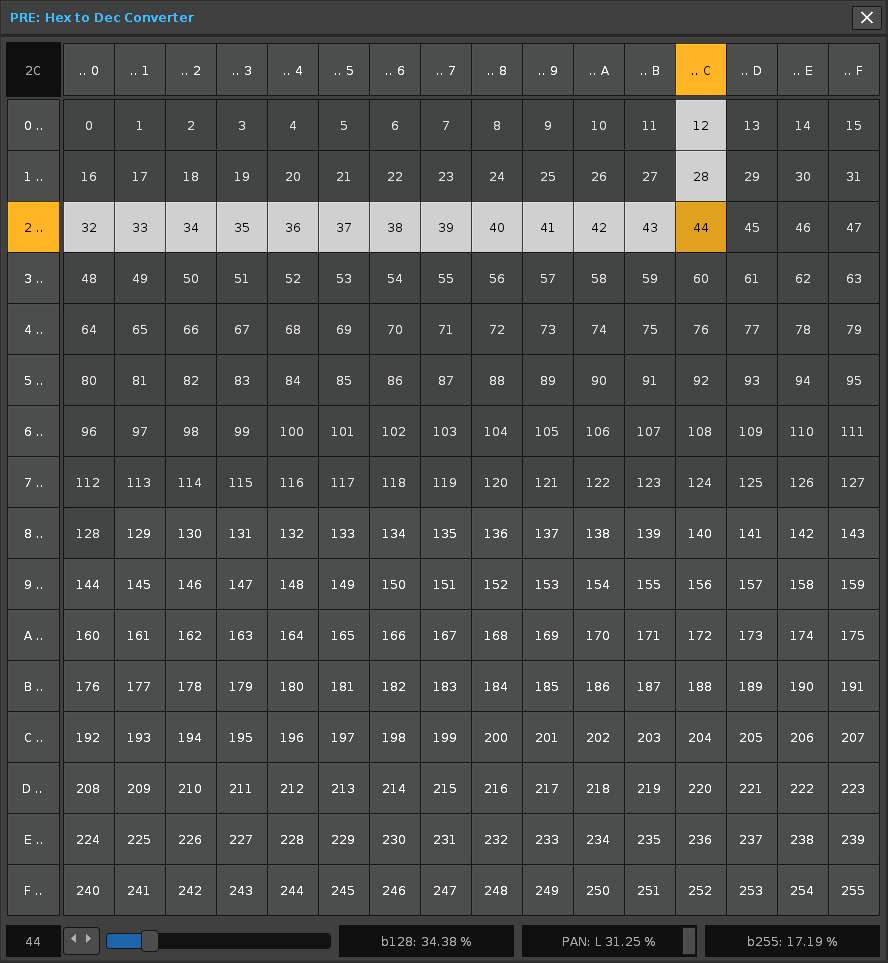Can you convert the numbers in your head or do you use table / tools for that?
Its just basic calculus to convert - so yes, you can do in the head. I could, but I am slow, untrained in it.
I find when working with hex though, after a while of practise it can become intuitive to use, at least in a tracker context. It has different properties than dec, like halving/doubling will not involve a 5 per digit, but rather something 2-centered, symmetric kind of thing. Dunno its hard to describe - its intuition anyways. Like you know after a while that 80 40 20 10 8 4 2 1 in hex is an easy to grasp sequence with numbers that for example used in a volume context will describe a log curve that is very suitable for describing volume steps that are distinguishable from each other.
This is also true for line numbers, the symmetrical properties and dominance of powers of two numbers fit very well into even music measure and rhythm, which also is about 2/4 and halving/doubling. Here I also have intuition trained in, I don’t convert in the head but just work with the hex.
But for example when doing arps with fx commands, you will have to learn the hex digits and their equivalent. I am lazy I only learnt A = ten and count up in the head.
I once had prepared a table for learning/training, but never really needed it. Also I usually don’t come into situations where I would have to convert non-even numbers. If that happened, I’d use a calculator app to convert numbers as needed. I do use the calculator quite often though, in sound design for example, to hit frequencies or intervals on the spot. But I think I never used it for converting hex numbers…
I know that F is 16… argh… no… it’s only 15 
Good explanation: https://owlcation.com/stem/Convert-Hex-to-Decimal
I think you should not waste time on these things, as much as possible. I have always defended that all the resources of your head should be centered on the musical composition itself, not on other things that depend on the DAW. Composing good music is so complex that it is better the less you waste time distracting the mind, for example, thinking about a conversion of numbers. For that there are tools.
Anyway, a good trick is to learn some intermediate numbers. In general you will only handle two ranges, from 0 to 127 (128 values) and from 0 to 255 (256 values). 128 is half of 256, which equals 80 (hex). 64 is half, which amounts to 40 (hex). If you memorize some key sections, you will know approximately how much you have in hexadecimal. It’s like learning 25, 50, 75 and 100% of a range. You will not get the exact number, but the approximate one, and that will help you not get distracted by these things.
On the other hand, you have the increasing sequence of values … 9, A, B, C, D, E, F (the next 0 always goes after F). For example, a 2F value is greater than 2B. A value 30 is obviously greater than 2F and less than 31.
The PRE tool has a sub tool for these things:

No need to explain anything to you. Just manipulate the table. You will immediately see the conversion. Obviously, using the tool also means wasting some time (access it, click with the mouse …). But they are things you can do “without thinking.”
Anyway, if you want to memorize, it’s like everything. Simply, based on repetition and training, you can do the conversion in your head. But then you should be a great expert in using Renoise. That is, you use it a lot to compose music.
By the way, the tool can help you memorize. Do as in the trivial.
I don’t come across many situations where I feel that I need to convert.
If I need to convert hex to dec, I would do print(0xEAB1) in the scripting terminal.
Otherwise Google. https://www.renoise.com/tools/dec-hex-converter seems like a simple enough tool as well.
I have never deepened here, but it may be possible to create a tool with two boxes of values that detect the value according to the position of the cursor and convert it. This would be especially useful in the V-P-D and effect columns, and it would be a very small window, similar to the link.
Wow, even I could include this functionality in the “PRE: Hex to Dec Converter” tool, with an ON/OFF switch. It would be much more “automatic.”
I use a Hex Template similar to Danoise GMKit Template